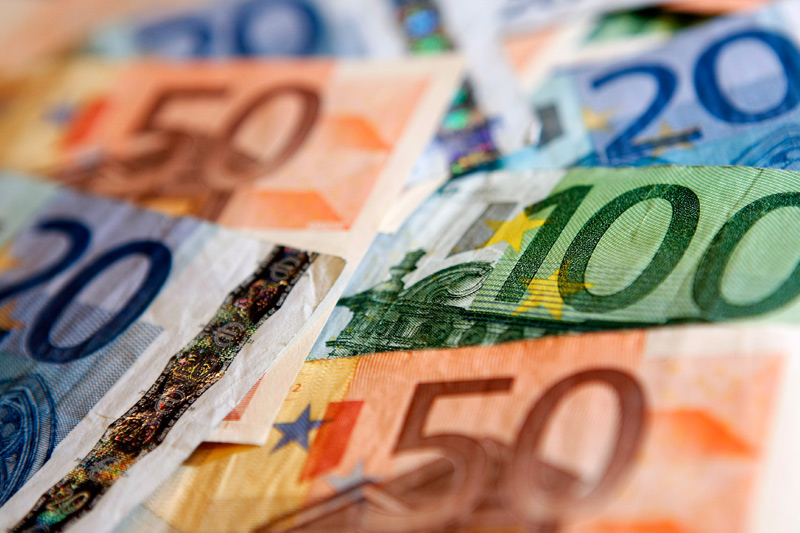Investing.com - The euro pulled back from session lows against the other major currencies on Tuesday, following comments by Germany's Finance Minister Wolfgang Schauble, who said defending the single currency was "worth any effort".
During European early afternoon trade, the euro edged higher against the U.S. dollar, with EUR/USD inching up 0.04% to 1.2934.
Speaking during a visit to Helsinki, Schauble said European policymakers should do everything in their power to protect the euro.
The euro weakened earlier following German media reports that lawyers for Germany's central bank are examining the legality of the European Central Bank's bond purchasing program, setting the stage for a possible legal challenge.
Elsewhere, Spain saw borrowing costs rise at an auction of short-term debt, reflecting lingering uncertainty over whether Madrid will request a full scale sovereign bailout.
On Thursday Madrid is to present its draft budget for next year and announce structural reforms, while the results of bank stress tests are due on Friday. In addition, ratings agency Moody’s is expected to complete a ratings review on Spain later this week.
Meanwhile, concerns over Greece continued to weigh, as Athens prepared to present a package of spending cuts at the end of this week, amid fears that the country’s budget shortfall could be larger than expected.
The single currency pulled away from a two-week low against the pound, with EUR/GBP down just 0.06% at 0.7967.
In the U.K., senior Bank of England policymaker Paul Fisher said earlier that the bond buying scheme announced by the ECB earlier this month appears to have calmed financial markets and could lay the foundations to resolve the region's debt crisis.
The euro was fractionally lower against the yen and the Swiss franc, with EUR/JPY dipping 0.04% to 100.62 and EUR/CHF inching down 0.07% to 1.2091.
Swiss National Bank Chairman Thomas Jordan said earlier Tuesday that it is still too early to say if the crisis in the euro zone is easing despite falling sovereign bond yields and reiterated that downside risks to the Swiss economy remain high.
The shared currency was mixed against the Australian, New Zealand and Canadian dollars, with EUR/AUD inching down 0.02% to 1.2400, EUR/NZD down 0.20% to 1.5681 and EUR/CAD easing up 0.13% to 1.2671.
Later in the session, ECB President Mario Draghi was to meet with German Chancellor Angela Merkel in Berlin.
During European early afternoon trade, the euro edged higher against the U.S. dollar, with EUR/USD inching up 0.04% to 1.2934.
Speaking during a visit to Helsinki, Schauble said European policymakers should do everything in their power to protect the euro.
The euro weakened earlier following German media reports that lawyers for Germany's central bank are examining the legality of the European Central Bank's bond purchasing program, setting the stage for a possible legal challenge.
Elsewhere, Spain saw borrowing costs rise at an auction of short-term debt, reflecting lingering uncertainty over whether Madrid will request a full scale sovereign bailout.
On Thursday Madrid is to present its draft budget for next year and announce structural reforms, while the results of bank stress tests are due on Friday. In addition, ratings agency Moody’s is expected to complete a ratings review on Spain later this week.
Meanwhile, concerns over Greece continued to weigh, as Athens prepared to present a package of spending cuts at the end of this week, amid fears that the country’s budget shortfall could be larger than expected.
The single currency pulled away from a two-week low against the pound, with EUR/GBP down just 0.06% at 0.7967.
In the U.K., senior Bank of England policymaker Paul Fisher said earlier that the bond buying scheme announced by the ECB earlier this month appears to have calmed financial markets and could lay the foundations to resolve the region's debt crisis.
The euro was fractionally lower against the yen and the Swiss franc, with EUR/JPY dipping 0.04% to 100.62 and EUR/CHF inching down 0.07% to 1.2091.
Swiss National Bank Chairman Thomas Jordan said earlier Tuesday that it is still too early to say if the crisis in the euro zone is easing despite falling sovereign bond yields and reiterated that downside risks to the Swiss economy remain high.
The shared currency was mixed against the Australian, New Zealand and Canadian dollars, with EUR/AUD inching down 0.02% to 1.2400, EUR/NZD down 0.20% to 1.5681 and EUR/CAD easing up 0.13% to 1.2671.
Later in the session, ECB President Mario Draghi was to meet with German Chancellor Angela Merkel in Berlin.
